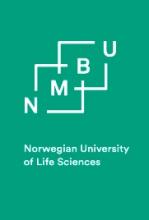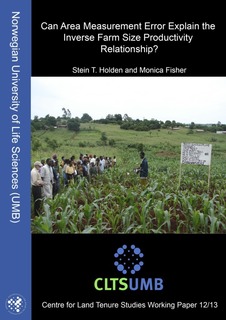Location
NMBU's mission is to contribute to the well-being of the planet. Our interdisciplinary research generates innovations in food, health, environmental protection, climate and sustainable use of natural resources.
About NMBU
NMBU's research is enabling people all over the world to tackle the big, global challenges regarding the environment, sustainable development, how to improve human and animal health, renewable energy sources, food production, and land- and resource management.
Members:
Resources
Displaying 61 - 65 of 98Can area measurement error explain the inverse farm size productivity relationship?
The existence of an inverse relationship (IR) between farm size and productivity in tropical agriculture remains a debated issue with policy relevance. Poor agricultural statistical data, including data on farm sizes and farm plot sizes that typically are self-reported by farmers, can lead to biased results and wrong policy conclusions. This study combines self-reported and GPSmeasured farm plot and farm sizes to assess how measurement error affects the IR using three rounds of farm plot and household data from Malawi.
Land Access and youth livelihood opportunities in Southern Ethiopia
This study aims to examine current land access and youth livelihood opportunities in Southern Ethiopia. Access to agricultural land is a constitutional right for rural residents of Ethiopia. We used survey data from the relatively land abundant districts of Oromia Region and from the land scarce districts of Southern Nations, Nationalities and Peoples’ (SNNP) Region. We found that youth in the rural south have limited potential to obtain agricultural land that can be a basis for viable livelihood. The law prohibits the purchase and sale of land in Ethiopia.
Joint land certification and intra-household decision-making: towards empowerment of wives?
We have used gender-disaggregated household panel data from 2007 and 2012 in combination with dictator games and hawk-dowe games to assess the effects of joint land certification of husbands and wives on wives' involvement in land-related decisions within households. Wives' stated preferences for stronger land rights to women and husbands' stated preferences for the traditional weak position of women were significantly affecting the wives' degree of within-household involvement in land-related decisions in opposite directions.
The roles of land tenure reforms and land markets in the context of population growth and land use intensification in Africa
This article provides a review of the past and potential future roles of land tenure reforms and land markets in Sub-Saharan Africa (SSA) as responses to population growth in the process of land use intensification and livelihood transformation.
Lineage and land reforms in Malawi: do matrilineal and patrilineal landholding systems represent a problem for land reforms in Malawi?"
This paper is about land tenure relations among the matrilineal and patrilineal cultures in Malawi. Data from the National Agricultural and Livestock Census are used to characterize marriage systems and settlement and landholding patterns for local communities. Marriage systems correspond to customary land tenure patterns of matrilineal or patrilineal land holding. The differences between the two major ways of land holding represent a particular challenge for land reforms intending to unify rules for land tenure and land devolution.



